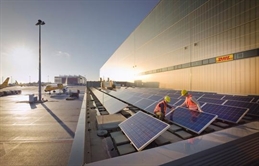
DHL Global Forwarding and TotalEnergies have signed a contract for a solar energy project in Dubai.
The deal is in continuation with their Strategic Cooperation Agreement signed in 2019.
In a statement, DHL said TotalEnergies will solarize eight of DHL’s sites in Dubai to cover the equivalent of over 46,000m² of photovoltaic panels — which will save more than 6,000t of CO2 the first year.
It said the project complements Deutsche Post DHL Group’s sustainability roadmap to achieve zero-emissions logistics from 2050 onwards.
“With an annual average of 8.7 hours of sunshine per day, Dubai has a clear advantage in terms of solar energy. I am all the more pleased that we can use this asset to advance our sustainability goals further", says Amadou Diallo, CEO DHL Global Forwarding Middle East and Africa.
“With TotalEnergies, we have a partner at our side, not only to drive forward the use of alternative fuels but also to optimize our overall energy consumption. In this way, we are going step by step to achieve our ambitious target to reduce all logistics-related emissions to zero by the year 2050.”
DHL noted that the whole solar system will produce over 14,000 MWh per year, enough energy to power over 16,000 homes yearly in the UAE.
In addition to supplying the sites with solar power eight electrical vehicle charging stations will also be installed. Thus, DHL said its Global Forwarding unit will be able to contribute to the Group's goal of electrifying 60% of its fleet by 2030.
The program also includes that 85% of the solar modules are recycled.
“All this contributes to making the entire product cycle more sustainable and saves more than 150,000 tons of CO2 over the contract duration,” it added.
In order to achieve its sustainability goals, Deutsche Post DHL Group is investing €7 billion in climate-neutral logistics solutions through 2030, by which point at least 30 percent of its fuel needs should be met by sustainable fuels.



